Summer Internship Cover Letter
[Your Name]
[Your Address]
[City, State, ZIP Code]
[Your Email Address]
[Your Phone Number]
[Date]
[Employer's Name]
[Company/Organization Name]
[Company Address]
[City, State, ZIP Code]
Dear [Employer's Name],
I am writing to express my strong interest in the [Position Title] internship opportunity at [Company/Organization Name] for the upcoming summer. As a [Your Current Year] student majoring in [Your Major] at [Your University], I am eager to contribute my passion for [Relevant Skills/Field] to your dynamic team.
Throughout my academic journey, I have cultivated a solid foundation in [Relevant Skills/Field] through coursework such as [Course Name 1] and [Course Name 2]. These experiences have not only equipped me with the theoretical knowledge but have also instilled in me a deep appreciation for the practical applications of [Relevant Skills/Field].
What particularly excites me about [Company/Organization Name] is your commitment to [Company's Mission or Values]. The innovative work you have undertaken in [Specific Project/Initiative] has caught my attention and motivated me to seek an internship with your esteemed organization. I am eager to contribute my skills in [Relevant Skills] to help further [Company/Organization Name]'s mission of [Company's Mission].
During my time as a student, I have demonstrated my dedication and leadership through my involvement in [Relevant Extracurricular Activities or Projects]. These experiences have honed my ability to work collaboratively in diverse teams, communicate effectively, and adapt to fast-paced environments—skills that I believe are crucial for a successful internship experience.
I am particularly drawn to [Company/Organization Name] because of its reputation for nurturing and developing young talents. The prospect of learning from industry experts and gaining hands-on experience aligns perfectly with my aspirations. I am confident that an internship at [Company/Organization Name] will provide me with valuable insights and practical skills that will enhance my academic and professional journey.
Enclosed is my resume, which provides further details about my academic achievements, relevant coursework, and extracurricular involvement. I would welcome the opportunity to discuss how my skills and background align with the internship's requirements in more detail. Thank you for considering my application.
Sincerely,
[Your Signature]
[Your Typed Name]
Enclosure: Resume
Entry-Level Marketing Internship Application
Dear Hiring Manager,
I am writing to express my strong interest in the Summer Marketing Internship position at [Company Name]. As a junior majoring in Marketing at [University Name], I am eager to apply my classroom knowledge to real-world campaigns and learn from your innovative team.
Through my coursework in digital marketing and consumer behavior, I have developed a solid foundation in market research, social media strategy, and content creation. Last semester, I led a team project analyzing brand positioning for a local startup, which resulted in actionable recommendations that increased their social media engagement by 40%. I am particularly drawn to [Company Name]'s recent [specific campaign or initiative], which aligns perfectly with my interest in data-driven marketing strategies.
I am excited about the opportunity to contribute fresh perspectives while gaining hands-on experience in campaign development, analytics, and client relations. My strong communication skills, attention to detail, and proficiency in Adobe Creative Suite and Google Analytics would allow me to add value to your team from day one.
I would welcome the opportunity to discuss how my academic background and enthusiasm for marketing can benefit [Company Name] this summer. Thank you for considering my application.
Sincerely,
[Your Name]
[Contact Information]
Career-Change Student Seeking Industry Experience
Subject: Summer Internship Application - Bringing Diverse Perspective to [Department]
Dear [Hiring Manager's Name],
I am writing to apply for the Summer Internship at [Company Name]. After five years in retail management, I am pursuing a degree in Data Science and seeking an internship that will help me transition into the tech industry while leveraging my professional experience.
My background in retail operations has given me valuable skills in problem-solving, team leadership, and customer analytics. Managing a team of 15 employees and overseeing inventory systems taught me the importance of data accuracy and operational efficiency—skills that translate directly to data analysis work. Now, as I complete my studies in Python, SQL, and statistical modeling, I am eager to apply these technical skills in a professional environment.
What distinguishes me from traditional candidates is my ability to bridge business operations with technical solutions. I understand both the practical challenges companies face and how data-driven insights can address them. Your company's focus on [specific area] particularly resonates with me, as I witnessed similar challenges in my previous career.
I am committed to bringing maturity, work ethic, and a unique perspective to your internship program. I would appreciate the opportunity to discuss how my combined experience in business operations and emerging technical skills can contribute to your team's projects this summer.
Thank you for your consideration.
Best regards,
[Your Name]
[Phone] | [Email] | [LinkedIn]
Research Internship Application - Academic Focus
Dear Dr. [Last Name],
I am writing to apply for the Summer Research Internship in [Department/Lab Name] at [Institution]. As a sophomore pursuing a degree in Biology with a concentration in molecular genetics, I am deeply interested in contributing to your research on [specific research topic].
I first learned about your work through your publication on [specific paper/topic], which I studied in my Genetics course last semester. Your innovative approach to [specific methodology or finding] fascinated me and inspired my own research interests. I am particularly intrigued by the potential applications of your work in [specific area], and I would be honored to contribute to ongoing projects in your laboratory.
My academic preparation includes coursework in molecular biology, biochemistry, and statistics, where I have maintained a 3.8 GPA. Additionally, I have gained laboratory experience through my current position as a research assistant in Dr. [Name]'s lab, where I have developed proficiency in PCR, gel electrophoresis, cell culture techniques, and data analysis using R. I recently co-authored a poster presentation on [topic] for our university's undergraduate research symposium.
Beyond technical skills, I bring strong analytical thinking, meticulous attention to detail, and genuine passion for scientific inquiry. I am eager to immerse myself in your lab's research environment, learn advanced techniques, and contribute meaningfully to your team's work.
I have attached my CV, transcript, and a letter of recommendation from Dr. [Name]. I would welcome the opportunity to discuss how I can contribute to your research program this summer.
Thank you for considering my application.
Respectfully,
[Your Name]
[University Email]
Creative Industries Internship - Enthusiastic and Personable
Hey [Hiring Manager's Name],
I'm reaching out about the Summer Internship opportunity at [Company Name], and I couldn't be more excited! As someone who's been obsessed with [industry—e.g., animation, design, content creation] since I was a kid, the chance to learn from the team that created [specific project] would be absolutely incredible.
I'm currently a junior studying [Major] at [University], but honestly, my education extends way beyond the classroom. I spend my evenings running a [YouTube channel/blog/Instagram account] where I [describe content], which has taught me everything from storytelling techniques to audience engagement strategies. My project on [specific project] received [specific achievement], which showed me that I could turn creative ideas into work that resonates with people.
What draws me to [Company Name] is your willingness to take risks and push boundaries. Your recent project on [specific work] was exactly the kind of bold, innovative storytelling I want to be part of. I bring not just skills in [specific software/tools] but also fresh ideas, boundless enthusiasm, and a work ethic that matches my passion.
I'd love to grab coffee (virtual or otherwise) and chat about how I can contribute to your team this summer. I promise I'm as dedicated as I am enthusiastic!
Thanks so much for considering me.
Cheers,
[Your Name]
[Portfolio Link] | [Contact Info]
Competitive STEM Internship - Results-Oriented
Subject: Application for Summer Software Engineering Internship
Dear Hiring Team,
I am applying for the Summer Software Engineering Internship at [Company Name]. As a computer science student at [University] with a strong track record in competitive programming and software development, I am confident I can make immediate contributions to your engineering team.
My technical qualifications include:
- Proficiency in Java, Python, C++, and JavaScript with experience in React and Node.js frameworks
- Top 5% ranking in the International Collegiate Programming Contest (ICPC) regional competition
- Development of three published applications with over 10,000 combined downloads
- Completion of advanced coursework in algorithms, data structures, and machine learning
Last summer, I interned at [Previous Company], where I optimized a critical data processing pipeline, reducing execution time by 65% and saving approximately 20 hours of computing resources weekly. I also contributed to the development of a customer-facing feature that improved user retention by 18%, as measured by three-month tracking data.
I am particularly interested in [Company Name]'s work on [specific technology/project]. Your approach to [specific technical challenge] aligns with my interests in scalable systems and efficient algorithm design. I am eager to tackle challenging problems, collaborate with experienced engineers, and contribute to products that impact millions of users.
I have attached my resume, GitHub profile, and links to my project portfolio. I am available for interviews at your convenience and look forward to discussing how I can contribute to your team's success this summer.
Thank you for your consideration.
Best regards,
[Your Name]
[Email] | [Phone] | [GitHub] | [LinkedIn]
Non-Profit/Social Impact Internship - Values-Driven
Dear [Organization Name] Selection Committee,
I am writing to apply for the Summer Internship with [Organization Name], an organization whose mission to [specific mission] deeply resonates with my personal values and career aspirations. As a student committed to social justice and community development, I am eager to contribute to your impactful work.
Growing up in [background/community], I witnessed firsthand the challenges that [specific issue] creates for underserved communities. This experience shaped my decision to study [Major] and dedicate my career to creating meaningful social change. Over the past two years, I have volunteered with [Organization], where I [specific contributions], serving over [number] community members and developing programs that addressed critical needs.
Your organization's approach to [specific program or initiative] is particularly inspiring to me. I am impressed by how you [specific achievement or approach], which demonstrates both innovation and deep commitment to sustainable impact. I bring not only relevant skills in [specific skills—e.g., program coordination, grant writing, community outreach] but also genuine passion for this work and understanding of the communities you serve.
I am seeking more than just resume experience—I want to be part of something that matters. I am ready to work hard, learn from your experienced team, and contribute to projects that make real differences in people's lives. My strong interpersonal skills, cultural competency, and dedication to service would make me a valuable addition to your team.
Thank you for considering my application. I would be honored to discuss how I can support [Organization Name]'s mission this summer.
With gratitude,
[Your Name]
[Contact Information]
Follow-Up After Career Fair Meeting
Subject: Following Up - Summer Internship Discussion at [Event Name]
Dear [Name],
It was a pleasure meeting you at the [Event Name] career fair on [Date]. Our conversation about [Company Name]'s approach to [specific topic you discussed] left me even more enthusiastic about the Summer Internship opportunity with your team.
As I mentioned, I am a [year] studying [Major] at [University], and I am particularly interested in [specific area discussed]. After our conversation, I researched [Company's recent project or initiative], which reinforced my excitement about the innovative work your team is doing.
I wanted to follow up by formally submitting my application materials. I have attached my resume and cover letter for the [specific internship position]. Given your insights about what the team is looking for, I believe my experience with [specific relevant experience] and my skills in [specific skills] align well with the role's requirements.
I would welcome the opportunity to continue our conversation and discuss in greater detail how I can contribute to [specific team or project]. Thank you for taking the time to speak with me at the fair, and I hope to hear from you soon regarding next steps.
Best regards,
[Your Name]
[Phone] | [Email] | [LinkedIn]
Referral-Based Application - Professional
Subject: Summer Internship Application - Referred by [Referrer's Name]
Dear [Hiring Manager's Name],
[Referrer's Name], [their position] at [Company Name], suggested I reach out to you regarding the Summer Internship position on your team. [He/She/They] thought my background in [relevant field] and interest in [specific area] would make me a strong candidate for the role.
I am currently a [year] at [University] studying [Major], with particular focus on [specialization]. My academic and extracurricular experiences have prepared me well for this opportunity. Specifically, I have [relevant experience or achievement], which developed my skills in [relevant skills]. Additionally, my involvement in [relevant activity] has given me practical experience in [relevant area].
[Referrer's Name] shared insights about your team's current projects, particularly [specific project or focus area]. This aligns perfectly with my interests and coursework in [relevant area]. I am especially intrigued by [specific aspect of the work], and I am eager to contribute to these initiatives while learning from experienced professionals.
I have attached my resume and would welcome the opportunity to discuss how my background and enthusiasm can benefit your team this summer. Thank you to both you and [Referrer's Name] for considering my candidacy.
I look forward to hearing from you.
Sincerely,
[Your Name]
[Contact Information]
What is a Summer Internship Cover Letter and Why Do You Need One
A summer internship cover letter is a formal document that accompanies your resume when applying for temporary professional positions during summer break. Unlike a resume that lists qualifications, a cover letter tells your story, explains your motivation, and demonstrates why you're the ideal candidate for that specific internship.
- Differentiates you from hundreds of other applicants with similar GPAs and coursework
- Demonstrates genuine interest in the company and role rather than mass-applying
- Provides context for resume gaps, career changes, or unconventional paths
- Showcases communication skills and professionalism that employers value
- Allows you to address specific job requirements and explain how you meet them
- Creates a personal connection with hiring managers before interviews
- Explains what you hope to gain from the experience and what you'll contribute
- Compensates for limited work experience by highlighting potential and enthusiasm
Who Should Send a Summer Internship Cover Letter
- Undergraduate students seeking professional experience in their field of study
- Graduate students looking to apply theoretical knowledge to practical settings
- Career-changers returning to school who need industry experience in their new field
- International students seeking practical training opportunities
- Recent graduates applying to post-graduation internship programs
- High school students applying to competitive pre-college internship programs
- Students from non-traditional educational paths (community college transfers, online programs)
- Anyone seeking structured learning experiences with mentorship components
To Whom Should You Address Your Summer Internship Cover Letter
- The internship coordinator or recruiter listed in the job posting when specified
- The hiring manager of the specific department offering the internship
- The human resources department when no specific contact is provided
- The research principal investigator for academic or lab-based internships
- The founder or CEO for startup and small company internships where hierarchy is flat
- Your professional contact when applying through referral or networking connection
- The fellowship or program director for structured internship programs
- Generic "Dear Hiring Manager" or "Dear Internship Selection Committee" only as last resort when no contact information is available despite research efforts
When Should You Send a Summer Internship Cover Letter
- Immediately upon discovering an internship posting that interests you, as positions fill quickly
- 4-6 months before your intended start date for competitive programs with formal deadlines
- After meaningful networking conversations at career fairs or informational interviews
- When you have completed prerequisite coursework or gained relevant skills mentioned in job descriptions
- Before traditional recruiting seasons: fall semester for summer positions, early spring for immediate opportunities
- Following up on verbal expressions of interest from company representatives
- When you discover unadvertised opportunities through networking or informational interviews
- After receiving feedback from mentors that your application materials are polished and ready
- During designated application windows for formal internship programs with specific deadlines
Requirements and Prerequisites Before Writing Your Cover Letter
- Research the company thoroughly: mission, values, recent news, culture, and specific projects
- Identify the correct recipient's name and title through LinkedIn, company website, or phone inquiry
- Review the complete job description and highlight keywords and required qualifications
- Prepare specific examples from coursework, projects, or experiences that match job requirements
- Update your resume to ensure consistency with claims made in your cover letter
- Gather information about company's industry, competitors, and current challenges
- Prepare your references and ensure they're aware they may be contacted
- Have writing samples, portfolio, or work examples ready if mentioned in application
- Ensure you meet minimum eligibility requirements (enrollment status, GPA, authorized to work)
- Identify specific aspects of the role or company that genuinely interest you
- Proofread all materials multiple times or have mentors review them
How to Write and Send Your Summer Internship Cover Letter
- Begin with research: spend 30-60 minutes understanding the company and role before writing
- Create an outline identifying three main points you want to convey about your candidacy
- Open with a compelling hook that captures attention—mention a specific project, connection, or achievement
- Structure body paragraphs around relevant experiences, using specific examples with quantifiable results when possible
- Connect your background explicitly to the internship's requirements and the company's needs
- Demonstrate knowledge of the company by referencing specific projects, values, or initiatives
- Explain what you hope to learn and contribute, showing it's mutually beneficial
- Close with clear call to action expressing enthusiasm for next steps
- Edit ruthlessly: remove clichés, passive voice, and generic statements
- Customize each letter for the specific position—never send generic cover letters
- Save as PDF with professional file name: "FirstName_LastName_Cover_Letter_CompanyName"
- Follow application instructions precisely regarding submission method and required documents
- Send during business hours (Tuesday-Thursday mornings are optimal) when applying via email
Formatting Requirements for Summer Internship Cover Letters
- Length: 250-400 words maximum, fitting on single page with standard margins
- Format: Business letter format with your contact information, date, and recipient's information when printed; email format when submitting electronically
- Font: Professional fonts like Arial, Calibri, or Times New Roman in 10-12 point size
- Spacing: Single-spaced within paragraphs, blank line between paragraphs
- Margins: One-inch margins on all sides
- Alignment: Left-aligned text for readability
- Tone: Professional yet personable; enthusiastic but not desperate; confident without arrogance
- Paragraphs: 3-4 substantial paragraphs (introduction, 1-2 body paragraphs, conclusion)
- File format: PDF to preserve formatting across different systems and devices
- Subject line for emails: Clear and specific, including position title and your name
- Signature: Professional sign-off like "Sincerely" or "Best regards" followed by your full name
- Contact information: Include phone number, professional email, and LinkedIn profile
- Avoid: Colors, graphics, unconventional fonts, or creative formatting unless applying to design/creative roles
Elements and Structure of an Effective Cover Letter
- Opening paragraph: State the position, how you learned about it, and immediate hook (compelling achievement, connection, or unique qualification)
- Body paragraph 1: Highlight most relevant academic experiences, coursework, or projects with specific examples and results
- Body paragraph 2: Discuss extracurricular activities, previous work experience, or skills that demonstrate fit for the role
- Company-specific paragraph: Show you've researched the company and explain why you're specifically interested in this organization
- Closing paragraph: Reaffirm enthusiasm, mention availability for interviews, thank the reader, and include call to action
- Contact information: Ensure complete and updated contact details are easily accessible
- Optional attachments: Mention any additional materials like portfolios, writing samples, or projects when relevant
- References line: Note that references are available upon request rather than including them directly
Common Mistakes to Avoid When Writing Your Cover Letter
- Using the same generic letter for multiple applications without customization
- Focusing on what the internship will do for you rather than what you'll contribute
- Simply repeating your resume instead of providing new context and personality
- Making spelling or grammatical errors that suggest carelessness
- Addressing the letter to the wrong person or company due to copy-paste mistakes
- Using overly casual language or slang inappropriate for professional correspondence
- Being too modest and underselling your achievements and capabilities
- Writing excessively long letters that exceed one page
- Starting with weak openings like "My name is..." or "I am writing to apply..."
- Making unsubstantiated claims without specific examples or evidence
- Using clichés like "team player," "hard worker," or "passionate" without demonstration
- Neglecting to explain gaps or unusual aspects of your academic path
- Forgetting to include essential contact information or including unprofessional email addresses
- Submitting without thorough proofreading or getting feedback from mentors
What to Do After Sending Your Summer Internship Cover Letter
- Send a confirmation email if applying through online portal to ensure materials were received
- Track your applications using a spreadsheet with company names, positions, dates, and contact information
- Wait 1-2 weeks before following up unless the posting specified a different timeline
- Send a brief, polite follow-up email inquiring about application status and reiterating interest
- Continue applying to other positions rather than waiting for responses from individual companies
- Prepare for potential interviews by researching common questions and practicing responses
- Update your application materials based on any feedback received
- Connect with company representatives on LinkedIn professionally after applying
- Set up Google alerts for the company to stay informed about relevant news
- Keep checking the company's career page for additional opportunities that might emerge
- Respond promptly (within 24 hours) to any communication from employers
- Maintain professionalism in all follow-up communications without appearing desperate or aggressive
Tricks and Tips for Standing Out
- Lead with your most impressive, relevant achievement in the opening paragraph to immediately capture attention
- Use the STAR method (Situation, Task, Action, Result) when describing experiences to provide compelling narratives
- Include specific metrics and quantifiable results whenever possible (percentages, numbers, timeframes)
- Mirror the language and keywords from the job description to pass applicant tracking systems
- Research and mention specific projects, values, or initiatives that resonate with you personally
- Show genuine curiosity by asking an insightful question about the role or company's future
- Connect your unique background or perspective to how it provides value to the organization
- Demonstrate cultural fit by referencing company values and showing how you embody them
- Include a brief, relevant story that illustrates your problem-solving skills or passion for the field
- Use active voice and strong action verbs to convey confidence and capability
- Address potential concerns proactively (limited experience, unusual background) and frame them as strengths
- Have someone in your target industry review your letter for authenticity and relevance
- Submit early in the application period when reviewers are fresh and less overwhelmed
Comparing Cover Letters to Alternative Application Methods
- Cover letter vs. networking: Cover letters provide formal documentation while networking creates personal connections; combine both approaches
- Cover letter vs. cold email: Cold emails are shorter (100-150 words) and more conversational; cover letters are formal and accompany applications
- Cover letter vs. LinkedIn message: LinkedIn messages are brief connection requests; cover letters are comprehensive applications
- Cover letter vs. video introduction: Videos showcase personality and communication skills but require more time investment; cover letters remain standard
- Traditional vs. creative cover letters: Traditional letters suit corporate environments; creative formats work for design, marketing, or startup roles
- Email vs. printed letter: Email is standard for most internships; printed letters show extra effort for formal programs or when hand-delivering
- Generic vs. customized letters: Customized letters take more time but yield significantly higher response rates
- Application portal vs. direct email: Follow instructions, but direct email to hiring manager (when appropriate) can increase visibility
Pros and Cons of Including a Cover Letter
Advantages:
- Significantly increases chances of interview by showing genuine interest and effort
- Allows you to explain unique circumstances or unconventional backgrounds
- Demonstrates written communication skills crucial for professional environments
- Provides opportunity to show personality and cultural fit beyond resume data
- Helps you stand out in competitive applicant pools with similar qualifications
- Shows professionalism and understanding of business communication norms
- Allows strategic positioning of experiences most relevant to specific role
Disadvantages:
- Requires significant time investment to customize for each application
- May not be read if recruiters only scan resumes in initial screening
- Poor cover letter can harm candidacy if it contains errors or is generic
- Creates additional opportunity for mistakes or inconsistencies with resume
- Can be challenging to write effectively without guidance or experience
- May be optional for some positions, creating uncertainty about necessity
- Requires ongoing updates as you gain new experiences and apply to different roles
How Many Internships Should You Apply To
- Apply to 15-25 positions for realistic chances of securing summer internship in competitive fields
- Quality over quantity: 10 well-researched, customized applications outperform 50 generic ones
- Create tiered approach: 5-7 "reach" positions (highly competitive), 10-12 "target" positions (good fit), 5-8 "safety" positions (strong qualifications)
- Allocate 45-90 minutes per application for research, customization, and polishing materials
- Start application process 4-6 months before desired start date for structured programs
- Apply to new positions weekly as postings emerge rather than batch-applying to everything at once
- Track metrics: aim for 30-40% callback rate for preliminary screenings if materials are strong
- Adjust strategy if not receiving responses after 10 applications—seek feedback on materials
- Consider 2-3 backup plans including summer courses, volunteer positions, or personal projects
- International students should apply more broadly (30-40 positions) due to visa sponsorship limitations
Frequently Asked Questions About Summer Internship Cover Letters
Should I mention my GPA in my cover letter? Mention GPA only if it's above 3.5 or if the posting specifically requests it; otherwise, let your resume speak for itself.
What if I have no relevant experience? Focus on transferable skills from coursework, student organizations, volunteer work, or unrelated jobs; emphasize eagerness to learn and strong foundational knowledge.
Can I use AI to write my cover letter? AI can help with initial drafts and structure, but you must personalize extensively, add specific examples, and ensure authentic voice to avoid generic-sounding letters.
How do I address career change or returning to school? Frame previous experience as an asset providing unique perspective and maturity; explain clearly why you're transitioning and how past work connects to new goals.
Should I explain why I'm interested in the company? Absolutely—demonstrating company knowledge and genuine interest is crucial; mention specific projects, values, or culture elements that attracted you.
What if the posting says cover letter is optional? Always include one unless you're certain it won't be read; "optional" often means "we're testing who puts in extra effort."
How do I follow up without being annoying? One polite email 1-2 weeks after applying is appropriate; if no response, follow up once more after another week, then move on.

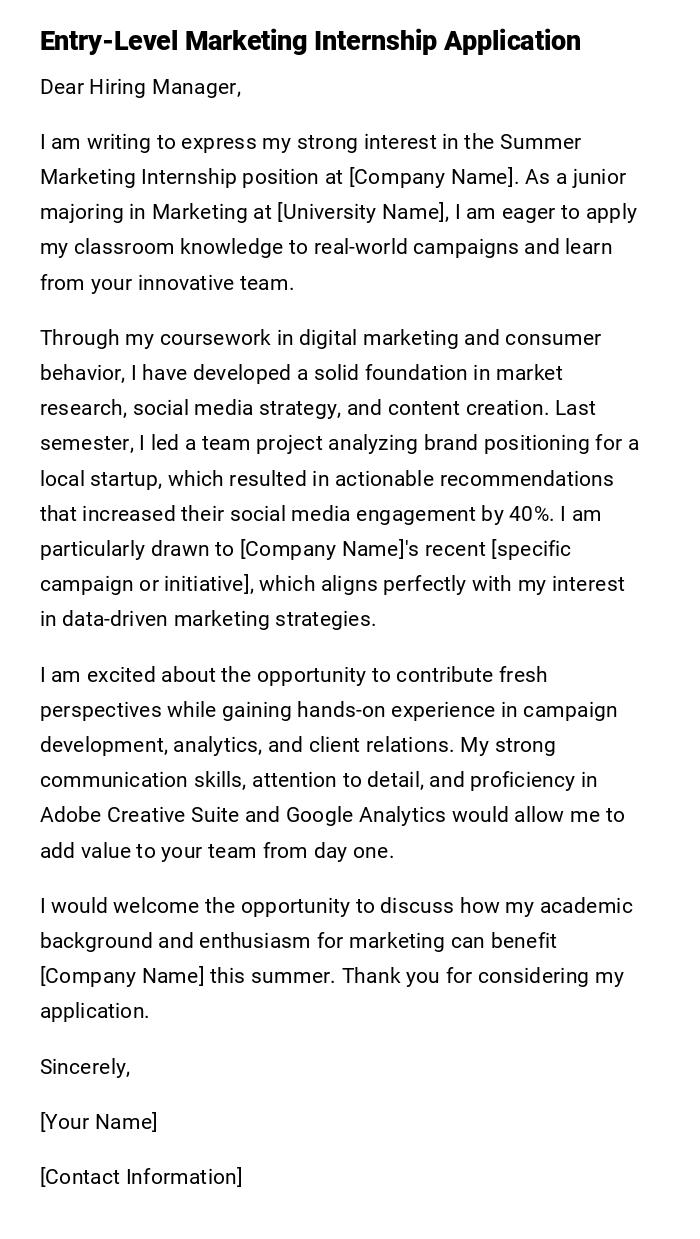
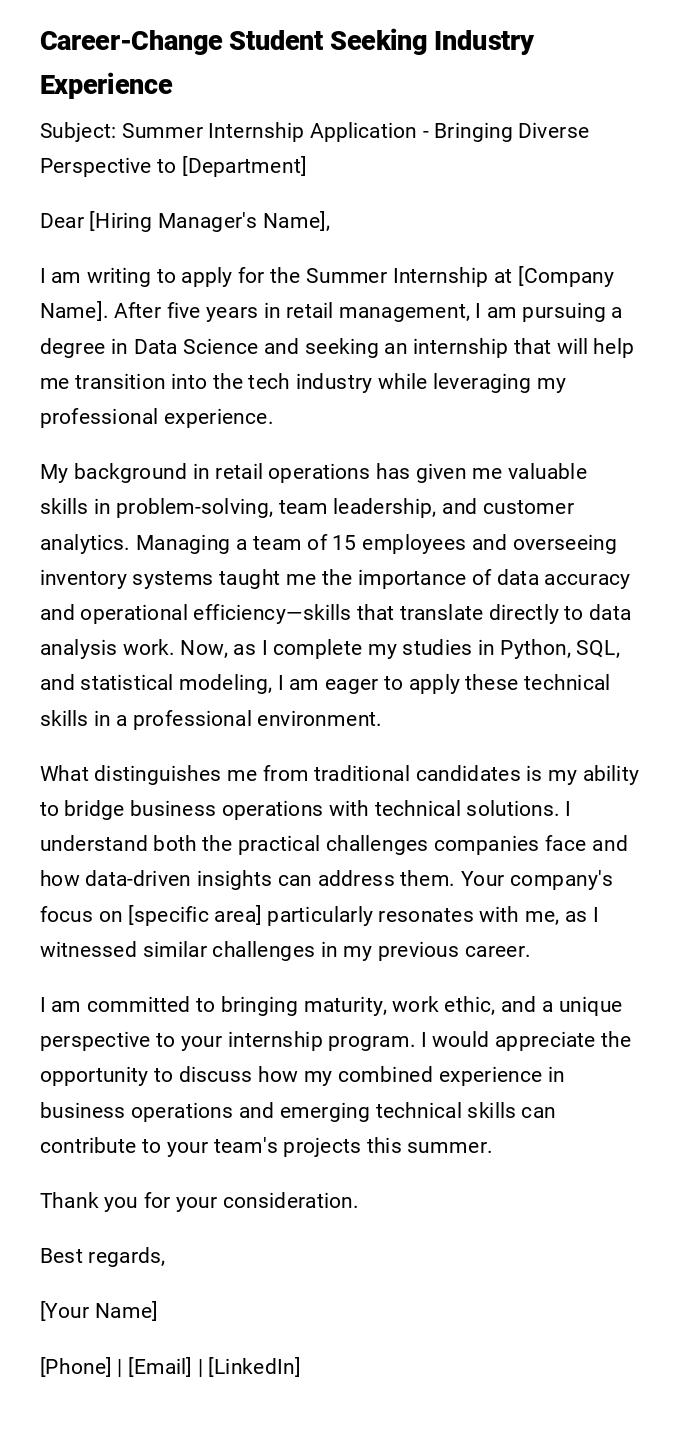
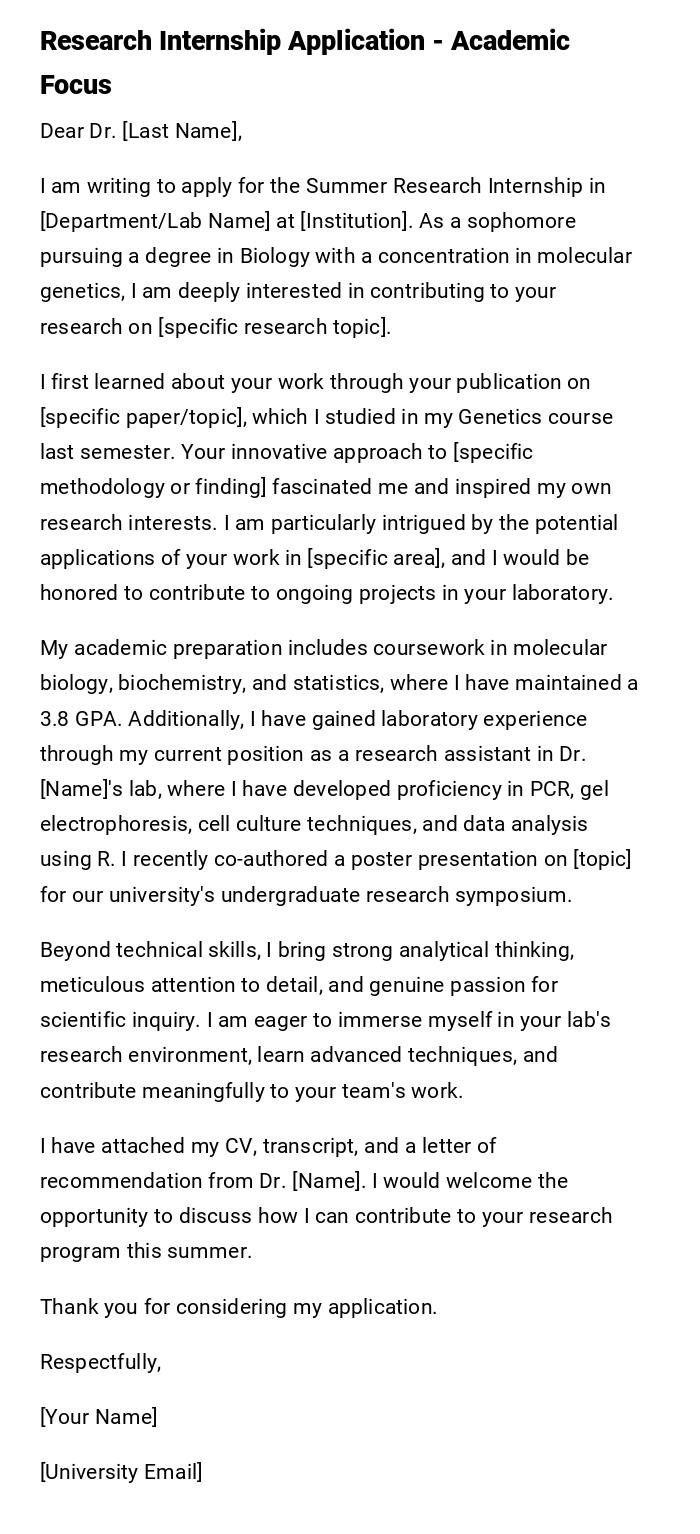

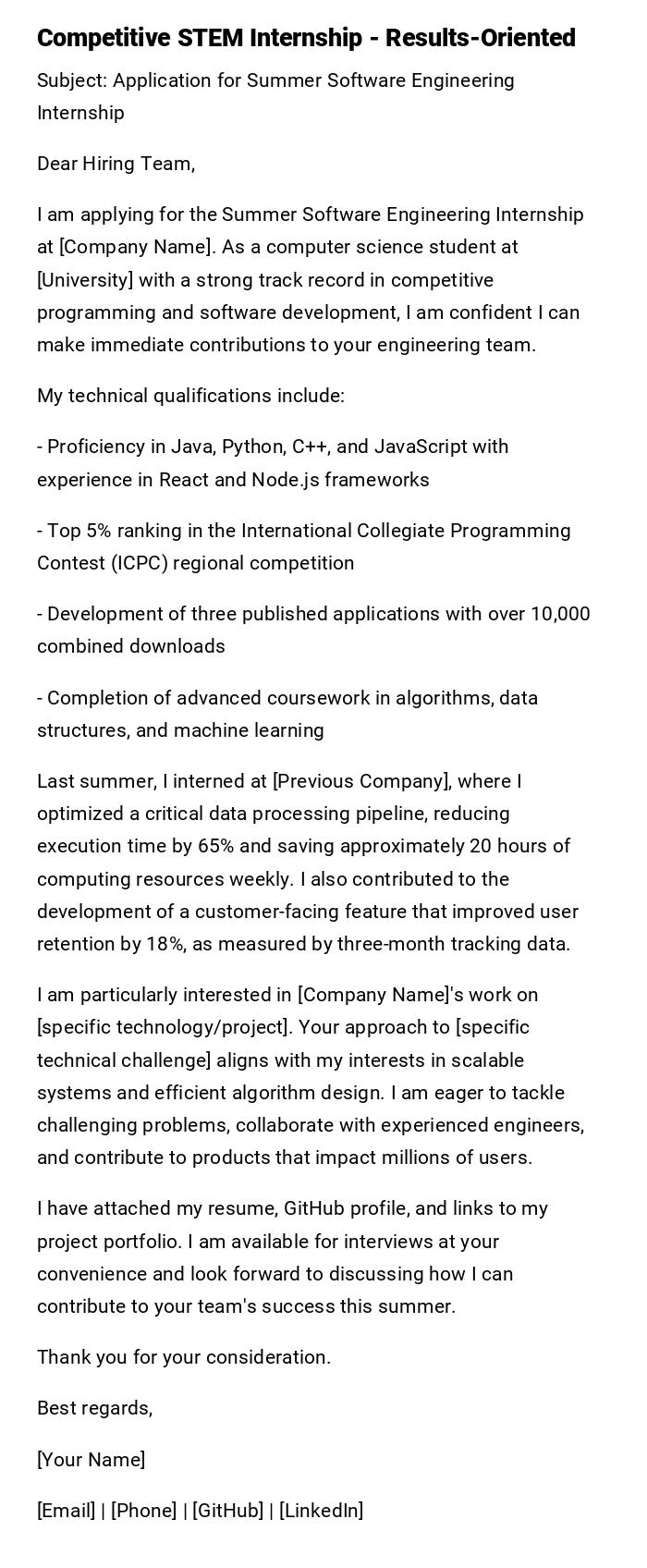
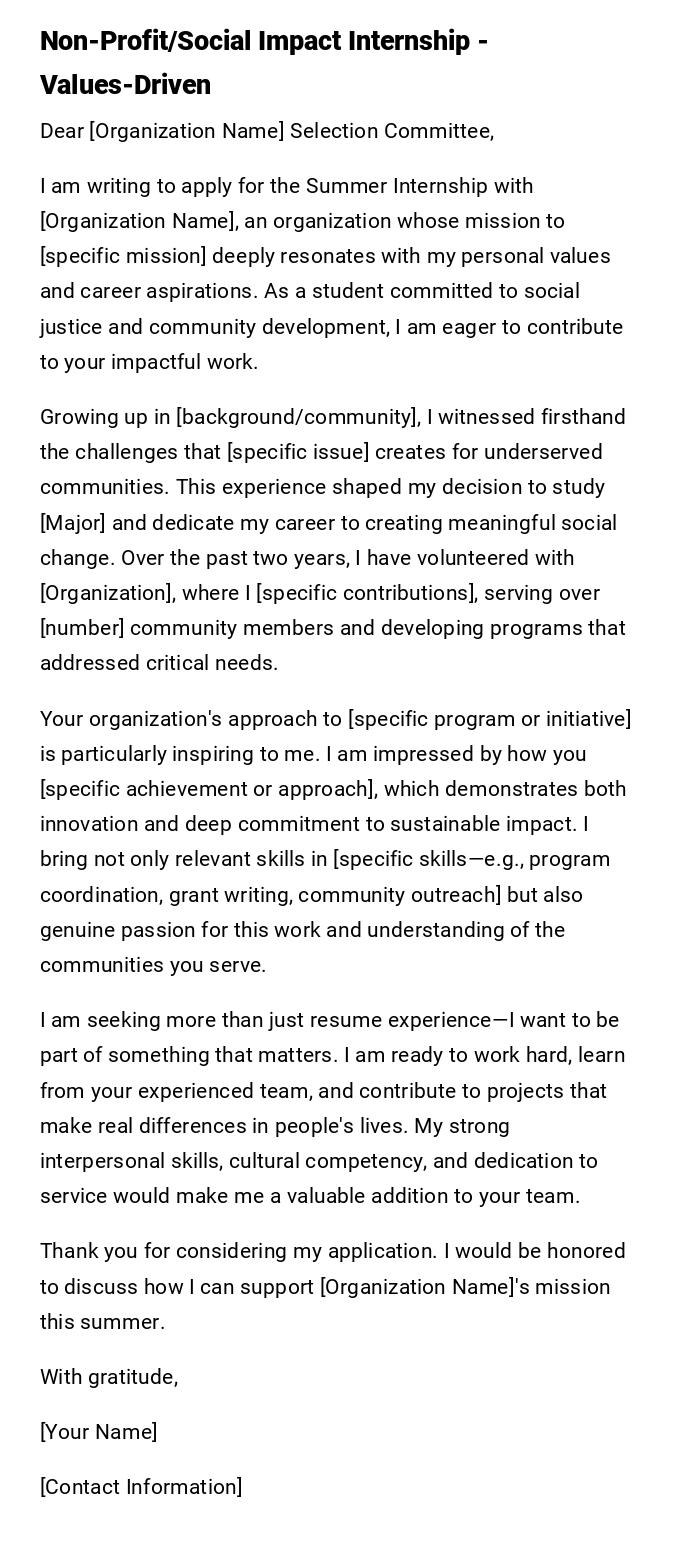
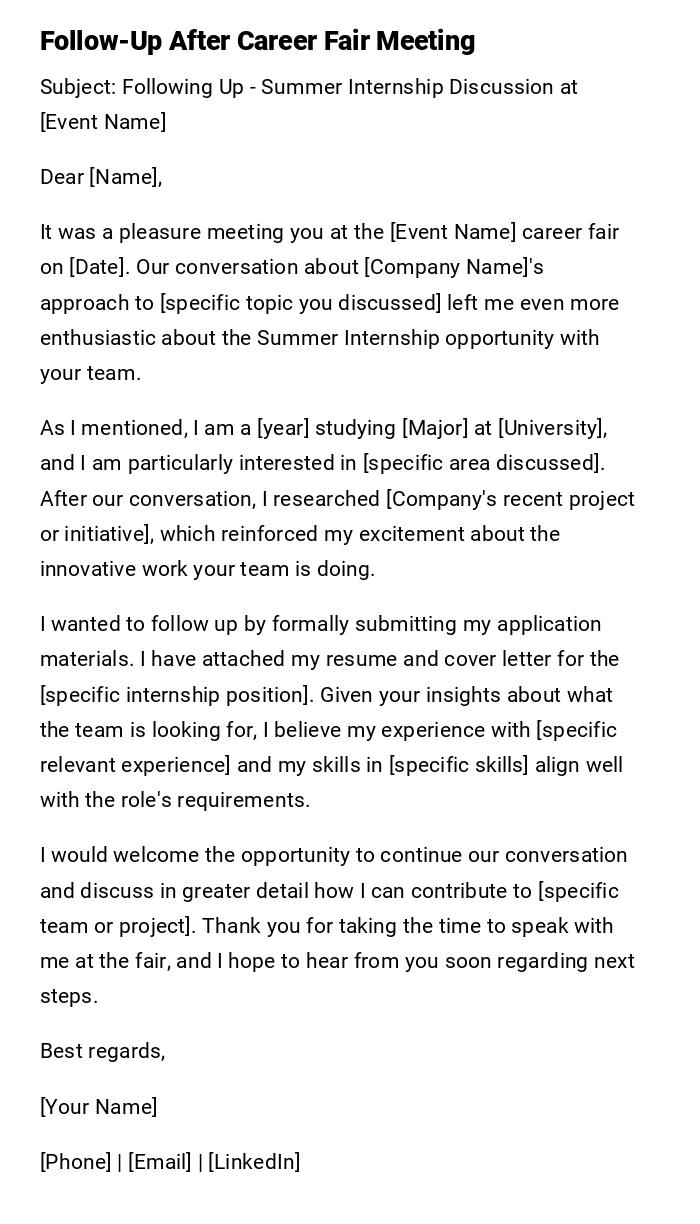
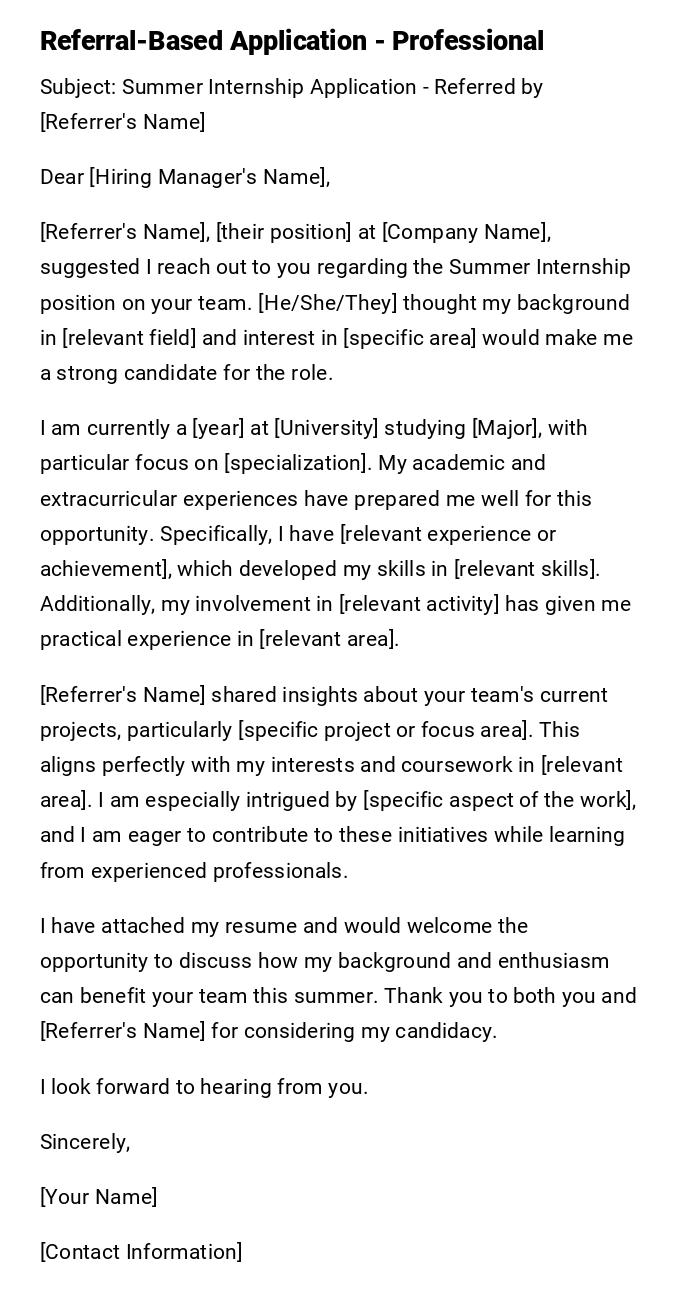

 Download Word Doc
Download Word Doc
 Download PDF
Download PDF